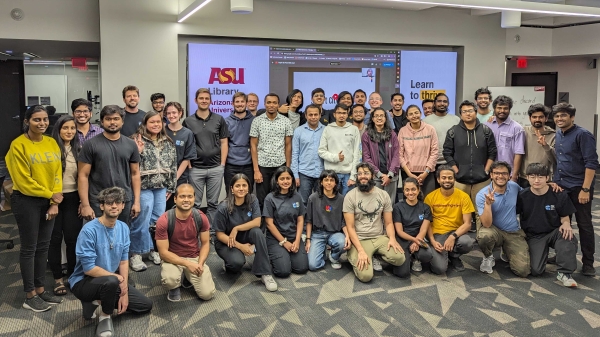Is there anybody out there?
A team of experts from ASU discussed the search to find out if we are alone in the universe — or not

“Two possibilities exist. Either we are alone in the universe or we are not. Both are equally terrifying.” — Arthur C. Clarke
With that quote flashing on a screen above them, a team of experts from Arizona State University began a discussion of the search to find out if we are alone — or not.
“There is a concerted hunt for life in the universe,” moderator and science journalist David Baron began.
Some on the panel — composed of an astrophysicist, astrobiologist, planetary scientist, lawyer and psychologist — are part of that hunt.
“We’re looking for Earths,” astrophysicist Steve Desch said. Astronomers measure gases blocking wavelengths of light. The right combination of gases indicate planets with potential for life.
Where might we find life in our solar system? There are three likely places, said planetary scientist David Williams: Mars, the Jovian moon Europa, and Enceladus, one of Saturn’s moons.
“Each has the ingredients of life,” Williams said.
"(On Mars), it’s going to be microbial and it’s going to be underground,” he said. Thermal vents beneath the surface may harbor life.
Europa is mostly covered in ice, with a liquid ocean beneath. Vents from geysers at the moon’s south pole spout material into space. A NASA mission to take a closer look launches in 2025.
Science journalist David Baron moderated the panel on the search for alien life. Photo by Dana Meyer
“If we find life on any of these worlds, it’s going to be microbial,” Baron said. “It’s not going to be building cities.”
Astrobiologist Sara Walker spends her career hunting aliens. What she looks for are “technosignatures,” things that can be produced with technology, like radio signals.
“A lot of the new thinking about technosignatures is that they are related to biosignatures,” Walker said.
Would the discovery of other civilizations bring humans together? Psychologist Yul Kwon is working on his doctorate. He was co-author of an international study assessing how people would react to the news we’re not alone.
The verdict? Mostly positive. “People tend to use positive words when describing their reactions,” Kwon said.
Walker once had a ride with an Uber driver who thought life had already been discovered beyond Earth. “For some people, it’s so not on their radar they’re surprised it’s not out there,” she said.
One respondent to Kwon’s survey asked, “Will we finally learn our purpose?”
Another had a Hollywood-conditioned response: "What if they are smarter than us and have the ability to attack us or use our planet for its resources?"
That’s unlikely, Desch said.
“The very fact they had the ability to come to our planet would require more resources than our planet has,” he said. “Why would they bother?”
People want to believe, Desch said. He cited the reaction to ʻOumuamua, the cylindrical interstellar object that passed through the solar system three years ago. In July 2019, astronomers finally reported that ʻOumuamua was an object of a "purely natural origin.”
“It reminded everyone of 'Rendezvous With Rama,'” he said.
"Rama" is a science fiction novel about a cylindrical alien starship that enters our solar system — written by Arthur C. Clarke.
Top illustration by Safwat Saleem
More Science and technology

SpaceHACK highlights student solutions to environmental challenges, digital divide
By Adrianna Nine About 250 students from around the world convened online and at Arizona State University on March 22 for the ASU Interplanetary Initiative’s second annual SpaceHACK for…

New AI for a new era of discovery
As the legend goes, in 1665, Sir Isaac Newton sat in his garden at Woolsthorpe Manor in England and looked on as a lone apple dropped from a tree branch, falling straight down. This chance encounter…

ASU receives 3 awards for research critical to national security
Three researchers in the Ira A. Fulton Schools of Engineering at Arizona State University have received grant awards under the Defense Established Program to Stimulate Competitive Research, or…
